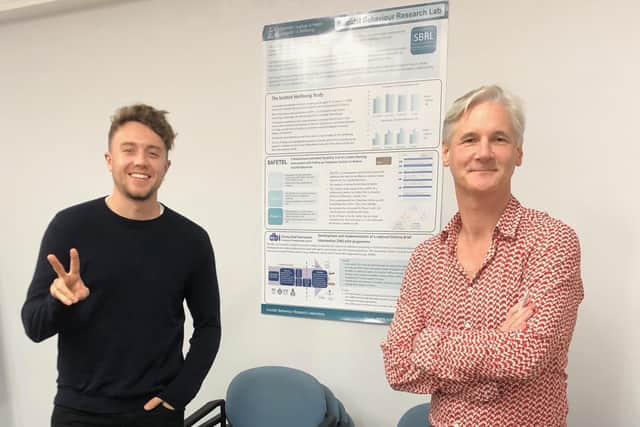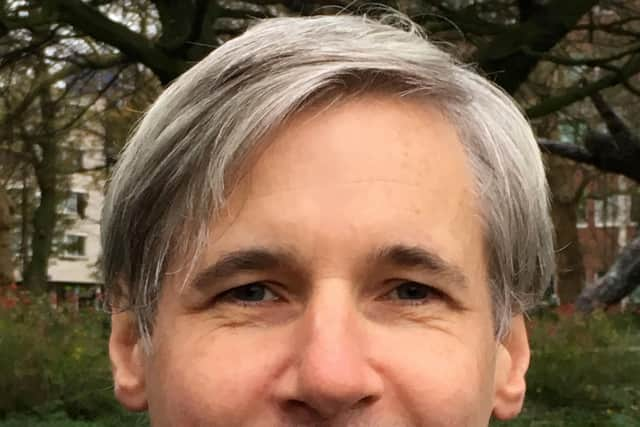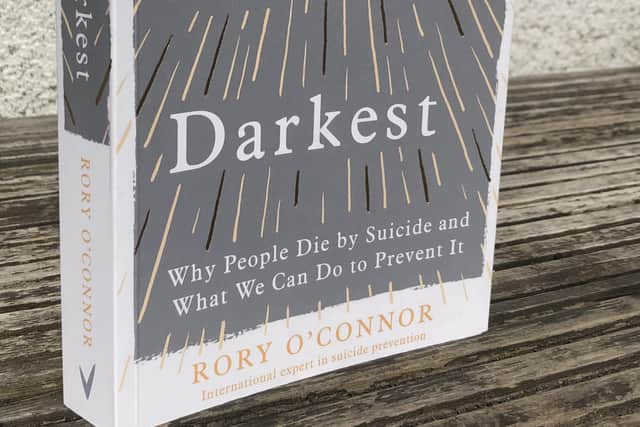‘Asking somebody you are concerned about whether they are suicidal can be the start of a life-saving conversation’
and live on Freeview channel 276
Professor Rory O’Connor’s answer is in response to a question about what motivated him to write his new book on the subject of suicide. O’Connor’s book, ‘When It Is Darkest: Why People Die by Suicide and What We Can Do to Prevent It’, was released last week, and explores the topic in great detail.
In an interview with the ‘Journal,’ Professor O’Connor explained what drove him to write the book, and the impact he hopes it has.
Advertisement
Hide AdAdvertisement
Hide Ad“I’ve written a number of books, but this is the first single-authored book which is aimed at a wide audience,” he said.


“I’m hoping the book is accessible to anyone with an interest in understanding suicide, but in particular, loved ones who have lost someone to suicide, people who have attempted suicide, as well as those people who are supporting people who are suicidal.
“It was written in a way whereby I have combined research evidence, with my own experience of suicide bereavement as well as other people’s stories. The book is really my journey in suicide research.’’
Professor O’Connor, who is a native of Derry heads up the Suicidal Behaviour Research Laboratory at the University of Glasgow. He is a world leader on suicide research and prevention and has been working in the area of suicide for the past 25 years.
Advertisement
Hide AdAdvertisement
Hide AdProf. O’Connor is the only person ever, in the UK or Ireland, who has been elected as the President of the International Association for Suicide Prevention (IASP), a role he currently holds, and also the past President of the International Academy of Suicide Research (IASR) - two of the foremost organisations in the field of suicide research and prevention.


The Professor has also contributed to six BBC documentaries on suicide, including ‘Suicide and Me’ with the rapper Professor Green and ‘Our Silent Emergency’ with Roman Kemp.
“One of the biggest myths around suicide is the notion that asking somebody if they are suicidal or not, will plant the idea in their head. That’s just an utter myth, and indeed one of the things I talk about in the book is that it’s so vitally important that we all can do something, no matter how big or small to prevent suicide.
“ Asking somebody you are concerned about, whether they are suicidal, can be the start of a life-saving conversation. So, it’s trying to smash that myth, because it is a myth. There’s no evidence at all that asking will plant that idea in someone’s head. It’s quite the opposite.’’
Advertisement
Hide AdAdvertisement
Hide AdOriginally from Duncreggan Road, Prof. O’Connor as well as other noted experts, such as Mental Health Champion for Northern Ireland, Siobhan O’Neill and Barry McGale, brought the 30th World Congress on Suicide Prevention to Derry in 2019. The city played host to hundreds of experts working in the field of suicide prevention.


O’Connor was keen to stress that his latest book, isn’t just another academic work for consideration, but rather an attempt to bridge the gap between expert and layperson.
‘‘In the last few years, it’s something I’ve been really wanting to do, to write a book which brings together that personal with the professional. I actually couldn’t really work out how to make that work in a way that I was comfortable with. It just so happened that I had this eureka moment and I was able to make sense of how I was able to do it. I wrote it in the last twelve months, most of it during lockdown.
“What’s unique about the book is that it brings together all the research I’ve been doing over the past 25 years, as well as the fact that I’ve met so many amazing people who have either lost loved ones to suicide or people who have struggled to stay alive every day, or people who have taken part in our research studies. It’s trying to bring that all together, to put a human face on the pain of suicide.
Advertisement
Hide AdAdvertisement
Hide Ad“It’s not written in an academic style, its written in a way for anybody with an interest in the field of suicide research to understand and appreciate,’’ he explained.
In the book, O’Connor gives the reader tips on asking those difficult questions, in an attempt to help people, understand all the complex set of factors that lead to suicide. In reading its contents, the author hopes that people will come away feeling better equipped with the skills and knowledge to try to help, either themselves or people around them, who are struggling day-to-day to stay alive.
During the interview, O’Connor spoke about his concerns for a society slowing emerging from a pandemic.
‘‘Thus far there is no evidence, that suicide rates have increased as a result of the pandemic across the UK. However, the concern is, we know pre-pandemic that the suicide rate was on the increase, so when furlough ends and we recover from the pandemic, there may be many people left behind and recovery may not be uniform,’’ he said.
Advertisement
Hide AdAdvertisement
Hide Ad‘‘I’m leading a study at the minute and what we know from the data is that young people are reporting higher levels of suicidal thoughts, people who are from socially disadvantaged backgrounds are more at risk, and people who have pre-existing mental health problems are all reporting worse mental health problems.
“ So, my concern is that, and this holds for Derry as much as anywhere else, is that it’s vital that we are targeting those vulnerable groups.
“I am particularly concerned about our young people; they have been through one heck of a ride in terms of mental health consequences.
“We know from all the evidence out there, that young people’s mental health has been really badly affected and what we need to do in Derry in particular, is make sure we are supporting our young people going forward as recovery continues.
Advertisement
Hide AdAdvertisement
Hide AdSadly, Derry over the years has also struggled from not having enough inward investment. It’s been great to see the number of strides the city has made in the last number of years and it’s such a brilliant city, but we need to make sure that investment continues in Derry, economic investment as well as investment in mental health services.
“In terms of demand, you need to make sure you’ve got the services that people need. And that these services are tailored and match the needs of people who are struggling.
“For example, there are long waiting lists to get access to child and adolescents mental health services, and my message is suicidal thoughts do not wait twelve months. Suicidal thoughts are here and now, that’s why we need to have treatment, support and crisis services established here and now.’’
O’Connor stressed the need, not only for tailored services now to cope with the demand for mental health services, but also offered his opinion on what preventative measures we as a society and city could take.
Advertisement
Hide AdAdvertisement
Hide Ad‘‘We need to work on challenging stigma around mental health, taking about it is a sign of strength, not of weakness. Mental health education needs to be absolutely square and central terms of school education, building resilience and coping. Recognising that people who have become suicidal often have experienced trauma early in life. And we need to ensure all services, whether it be schools, hospitals or even the police are trauma informed.’
“One the facts we know is that with the history of the Troubles in NI, there is a whole generation of people who have been affected by trauma. And how that manifests itself, is that people with a history of trauma are often reluctant to seek help, or are less trusting of statutory services. So, I think as a preventative measure is to promote a compassionate response which recognises the trauma that much of our population or the population of Derry more broadly have gone through.
“Deprivation and inequality are at the heart of mental health problems that’s why at a government level, the Northern Ireland Assembly need to make sure we have continued investment to tackle inequality in Derry.’’
At 352 pages, O’Connor’s book is at times a personal exploration of the issues around suicide, yet at no point does reading it feel like a chore. Where in some parts, it conveys moments of sadness, It also proves impossible to put down, and ultimately for the reader, leaves one with a sense that everyone can play a part in helping to prevent suicide.
Advertisement
Hide AdAdvertisement
Hide AdA key takeaway from the book is to ask someone directly, who you may feel is suicidal, if they are indeed feeling as such.
“That’s a difficult question to ask,’’ O’Connor said.
‘‘But if you ask it, what we often know, is that with people who are suicidal, there is a sense of relief because someone has noticed that they are not well or are struggling. Then you can work with them in a compassionate, collaborative way to try to see how you can help that person get the help and support they require.
“For me, it’s starting about starting that conversation, to help that person recognise that they are important and they are valued.”
Throughout the interview, O’Connor spoke warmly of his hometown, and it was clear that all concerns he raised, about those affected by suicide and the provision of services in Derry came from a love for the city and its people, that’s clearly never left him.
Advertisement
Hide AdAdvertisement
Hide Ad“I’m really proud to be a native of the city and I’m absolutely passionate about suicide prevention, particularly in Derry,” he said.
“Obviously, I still have family there and I am a proud Derryman. I think there’s something about growing up in Derry, you grow up in this sort of shadow of Belfast or Dublin. But what we breed in Derry, is actually brilliant people and we should never put ourselves down by saying we can’t do it,’’ he added.
When It Is Darkest: Why People Die by Suicide and What We Can Do to Prevent It, was released on May 6. The book is available in bookstores and online.
You can find more about Professor O’Connor on Twitter: @suicideresearch.
Advertisement
Hide AdAdvertisement
Hide AdAnyone in distress in NI can contact Lifeline 24/7 helpline can be contacted for free on 0808 808 8000 in confidence; The Samaritans can be contacted 24/7 on 02871 265511 or Freephone 116 123 in confidence; Children can contact Childline 24 hours a day, 365 days a year on 0800 1111 for any issue or by visiting www.childline.org.uk in confidence.
Anyone in distress in RoI can contact Pieta House free on 1800 247 247 or text HELP to 51444; TEXT Crisis Textline Ireland on 50808 - a free 24/7 text service; Ring Samaritans 24/7 on freephone number 116-123,